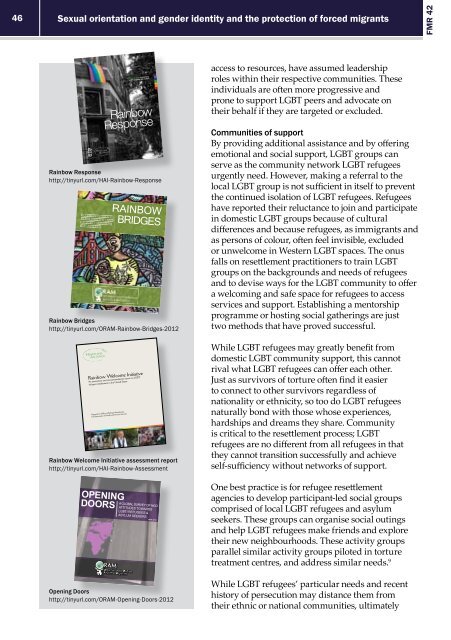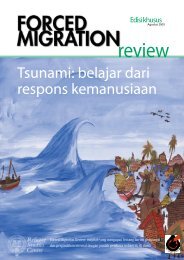FMR 42 full issue pdf - Forced Migration Review
FMR 42 full issue pdf - Forced Migration Review
FMR 42 full issue pdf - Forced Migration Review
Create successful ePaper yourself
Turn your PDF publications into a flip-book with our unique Google optimized e-Paper software.
312.660.1670<br />
02<br />
02<br />
01<br />
46 Sexual orientation and gender identity and the protection of forced migrants<br />
<strong>FMR</strong> <strong>42</strong><br />
Rainbow Response<br />
Heartland A liance for Human Needs & Human Rights<br />
208 South LaSa le Street<br />
Chicago, IL 60604<br />
RainbowWelcome@heartlandalliance.org<br />
www.heartlanda liance.org<br />
Copyright Information<br />
Reproduction of the contents of this manual is not permi ted<br />
without express wri ten consent of Heartland A liance.<br />
Rainbow Response A practical guide to rese tling LGBT refugees and asylees<br />
Rainbow Response<br />
Rainbow Response<br />
Rainbow Welcome Initiative<br />
An assessment and recommendations report on LGBT<br />
refugee resettlement in the United States<br />
Prepared for O fice of Refugee Rese tlement,<br />
US Department of Health and Human Services<br />
OPENING<br />
DOORS<br />
A practical guide to resettling<br />
LGBT refugees and asylees<br />
Rainbow<br />
Response<br />
Rainbow Response<br />
http://tinyurl.com/HAI-Rainbow-Response<br />
7274_Cover.in d 1 9/14/12 10:10 AM<br />
A COMMUNITY GUIDE TO<br />
REBUILDING THE LIVES<br />
OF LGBTI REFUGEES<br />
AND ASYLEES<br />
RAINBOW<br />
BRIDGES<br />
Rainbow Bridges<br />
http://tinyurl.com/ORAM-Rainbow-Bridges-2012<br />
Rainbow Welcome Initiative assessment report<br />
http://tinyurl.com/HAI-Rainbow-Assessment<br />
A GLOBAL SURVEY OF NGO<br />
ATTITUDES TOWARDS<br />
LGBTI REFUGEES &<br />
ASYLUM SEEKERS<br />
JUNE 2012<br />
Opening Doors<br />
http://tinyurl.com/ORAM-Opening-Doors-2012<br />
access to resources, have assumed leadership<br />
roles within their respective communities. These<br />
individuals are often more progressive and<br />
prone to support LGBT peers and advocate on<br />
their behalf if they are targeted or excluded.<br />
Communities of support<br />
By providing additional assistance and by offering<br />
emotional and social support, LGBT groups can<br />
serve as the community network LGBT refugees<br />
urgently need. However, making a referral to the<br />
local LGBT group is not sufficient in itself to prevent<br />
the continued isolation of LGBT refugees. Refugees<br />
have reported their reluctance to join and participate<br />
in domestic LGBT groups because of cultural<br />
differences and because refugees, as immigrants and<br />
as persons of colour, often feel invisible, excluded<br />
or unwelcome in Western LGBT spaces. The onus<br />
falls on resettlement practitioners to train LGBT<br />
groups on the backgrounds and needs of refugees<br />
and to devise ways for the LGBT community to offer<br />
a welcoming and safe space for refugees to access<br />
services and support. Establishing a mentorship<br />
programme or hosting social gatherings are just<br />
two methods that have proved successful.<br />
While LGBT refugees may greatly benefit from<br />
domestic LGBT community support, this cannot<br />
rival what LGBT refugees can offer each other.<br />
Just as survivors of torture often find it easier<br />
to connect to other survivors regardless of<br />
nationality or ethnicity, so too do LGBT refugees<br />
naturally bond with those whose experiences,<br />
hardships and dreams they share. Community<br />
is critical to the resettlement process; LGBT<br />
refugees are no different from all refugees in that<br />
they cannot transition success<strong>full</strong>y and achieve<br />
self-sufficiency without networks of support.<br />
One best practice is for refugee resettlement<br />
agencies to develop participant-led social groups<br />
comprised of local LGBT refugees and asylum<br />
seekers. These groups can organise social outings<br />
and help LGBT refugees make friends and explore<br />
their new neighbourhoods. These activity groups<br />
parallel similar activity groups piloted in torture<br />
treatment centres, and address similar needs. 9<br />
While LGBT refugees’ particular needs and recent<br />
history of persecution may distance them from<br />
their ethnic or national communities, ultimately




